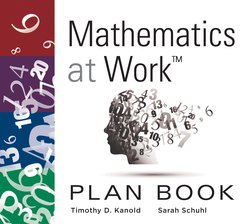Читать книгу Mathematics at Work™ Plan Book - Sarah Schuhl - Страница 9
На сайте Литреса книга снята с продажи.
ОглавлениеThe PLC at Work Process as the Foundation for Mathematics at Work
To create a PLC at Work, focus on learning rather than teaching, work collaboratively, and hold yourself accountable for results.
Three big ideas and four critical questions drive the work of the PLC process (DuFour et al., 2016).
1. A focus on learning: Teachers focus on all students learning at high levels as the fundamental purpose of the school.
2. A collaborative culture: Teachers work together in teams interdependently and take collective responsibility for the success of all students.
3. A results orientation: Team members are constantly seeking evidence of the results they desire—high levels of student learning.
Additionally, collaborative mathematics teams in a PLC at Work focus on four critical questions (DuFour et al., 2016) as part of their instruction, task-creation, homework, and grading routines.
1. What knowledge, skills, and dispositions should every student acquire as a result of this mathematics unit, course, or grade level?
2. How will we know when each student has acquired the essential mathematics knowledge and skills?
3. How will we respond when some students of mathematics do not learn?
4. How will we extend the learning for students of mathematics who are already proficient?
The four critical questions of a PLC at Work provide an equitable formative process for your professional work in mathematics assessment, intervention, instruction, homework, and grading. Imagine the access and opportunity gaps that will exist if you and your colleagues do not agree on the core learning standards for each unit as well as the level of rigor for the essential question (question 1): What do we want all students to know and be able to do?
Imagine the devastating effects on students if you do not reach team agreement on the rigor of lower- and higher-level cognitive demand for the mathematical tasks you use to engage students in mathematics lessons and assessments (question 2).
Imagine the lack of student agency (voice, ownership, perseverance, and action during learning) if you do not work together to create a unified, robust formative process for helping students own their response during class, reflecting when they are and are not learning during the lesson and after each assessment (questions 3 and 4).
For these reasons, we refer to our process as Mathematics in a PLC at Work. For you and your colleagues to effectively answer the four critical questions of a PLC at Work, in regard to a lesson’s instruction and tasks, requires the development, use, and understanding of lesson-design criteria that cause students to engage in the lesson, persevere through the lesson, and embrace their errors as they demonstrate learning pathways for the various mathematics tasks you present to them. Additionally, answering the critical questions well while planning for homework, grading, assessment, and intervention requires structure through the development of products for a team’s work together. It also requires a formative culture through the process of how you work with your team to use those products.
Your team reflecting together and then taking action around the right mathematics lesson-design work is the key to improved student learning. The actions you and your colleagues take together can improve the likelihood of more equitable mathematics learning experiences for every K–12 student. The reflect, refine, and act cycle illustrates this perspective about the process of lifelong learning.
This is a formative learning cycle. When you embrace mathematics learning as a process, you and your students:
• Reflect—Work the task or tasks, and then ask, “Is this the best solution strategy?”
• Refine—Receive FAST feedback and ask, “Do I embrace my errors?”
• Act—Persevere and ask, “Do I seek to understand my own learning?”
This cycle provides a systematic way to structure and facilitate in-depth team discussions. Additionally, the Mathematics in a PLC at Work framework on the next page focuses on six teacher team actions and two mathematics coaching actions within four primary categories. The eight actions focus on the teacher teams’ professional work and how they should respond to the four critical questions of a PLC at Work (DuFour et al., 2016).
The reflect, refine, and act cycle and the Mathematics in a PLC at Work framework will guide your work in planning unit assessments, daily instruction, daily homework, grading practices, and systematic interventions.
